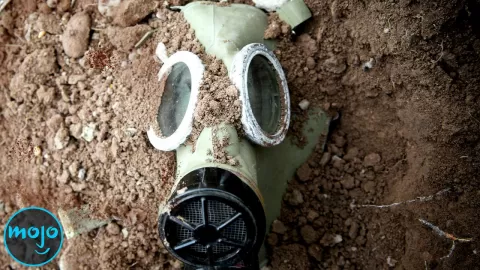The 10 Most Prepared Countries for Nuclear Warfare

#10: Sweden
This Scandinavian nation boasts a well-developed civil defense system designed to protect its citizens in the event of a conflict. It has a large amount of underground shelters which are capable of accommodating a large portion of the population, and these are equipped with essential supplies and are maintained so they are always ready for use. Sweden regularly conducts drills and updates its emergency response plans for nuclear incidents. The nation's investment in renewable energy, such as hydroelectric and wind power, locks in a stable and independent supply. Collaboration with global organizations strengthens its nuclear safety measures and readiness for potential events.
#9: South Africa
The vast distance from potential nuclear conflict zones also greatly benefits South Africa, providing a natural buffer against direct attacks. Investments in infrastructure have resulted in comprehensive preparedness programs and disaster response initiatives. The country's medical and evacuation services are well-developed, enhancing its ability to manage threats. South Africa's low profile in broader military conflicts further decreases the risk of being targeted, and the country participates in non-proliferation treaties and collaborates worldwide to boost its safety protocols, further bolstering its readiness for potential doomsday scenarios.
#8: Finland
Finland’s extensive civil defense preparations ensure a high level of preparedness for nuclear scenarios. The country has a network of shelters ready to protect people from fallout, and they are well-maintained and regularly updated to meet ultramodern safety standards. Finland conducts frequent emergency drills and has detailed response plans for nuclear incidents, ensuring that both the government and citizens are ready to act swiftly. The country’s energy self-sufficiency, including investments in renewables, would be capable of providing stability in the event of mass disruption.
#7: Canada
The Great White North’s vast, sparsely populated land and extensive natural resources provide major advantages in a nuclear scenario. The country's investments on the home front include the Canadian Forces Nuclear, Biological, and Chemical Defence Company, specialized in managing various threats. This makes certain that Canada has trained personnel ready to respond and assist. The nation's emergency shelters and reserves of essentials such as food and water solidify its readiness, and its vast freshwater reserves and agricultural lands can provide a stable supply of survival necessities.
#6: Singapore
Advanced infrastructure makes Singapore exceptionally well-prepared for nuclear threats. The city-state has developed many underground shelters able to protect from fallout. These are equipped with medical facilities geared to prolonged survival. Singapore regularly conducts rigorous emergency practice drills, ensuring that both the government and citizens are ready to respond swiftly. The country’s investments in advanced technology, including state-of-the-art detection and decontamination systems, further improve its ability to manage threats effectively. Singapore's location, with large water bodies acting as natural barriers, adds an extra layer of protection against radioactive contamination.
#5: Iceland
Remote isolation in the North Atlantic provides Iceland with protection against fallout. The country's geothermal energy provides a relatively stable and independent power supply, which is crucial in the event of global disruptions. Iceland has a strong civil defense, which translates to readiness for various scenarios. The low population density and lack of strategic military targets further reduce the risk of huge impacts from an attack. Iceland's emphasis on neutrality and peacekeeping minimizes its involvement in international conflicts, enhancing its overall safety. The nation’s robust infrastructure, combined with its comprehensive emergency response capabilities, makes it highly resilient to nuclear threats.
#4: Chile
Geographical features, including the Andes mountains and a long coastline, provide Chile with natural buffers against fallout. Chile has invested in disaster preparedness, including medical and evacuation services for various emergencies. The nation's isolation in the southern hemisphere further lowers the risk of direct attacks, while its political neutrality and focus on peacekeeping minimize involvement in worldwide conflicts. Chile conducts regular safety drills with detailed protocols for managing emergencies. The country also participates actively in non-proliferation treaties with pan-national organizations to enhance its nuclear safety measures, further bolstering its readiness.
#3: Australia
Australia’s geographical isolation in the southern hemisphere significantly reduces the risk of being targeted in nuclear conflicts. The country is well-prepared with a robust amount of shelters and a reserve of supplies, including food and medicine. Australia produces more than enough food to sustain its citizens and has substantial energy reserves, ensuring stability during vast disruptions. The National Emergency Management Agency coordinates disaster response efforts. Regular public education campaigns and drills keep people informed and prepared. Australia’s political alliances, particularly with Western nations, and its strong diplomatic relations further increase its security.
#2: Turkey
Turkey has made significant investments to prepare for potential nuclear threats. The country has, over the decades, developed a network of shelters and bunkers, particularly in major cities, to protect itself. It has detailed response plans for various disaster scenarios, including nuclear ones. Turkey’s location, and its role as a bridge between Europe and Asia, necessitate strong diplomatic relations and participation in non-proliferation treaties, and these efforts reduce the likelihood of becoming a nuclear target. Additionally, Turkey collaborates with global authorities to fine-tune its safety protocols, further strengthening its readiness to protect its people.
#1: Switzerland
Excellent infrastructure and planning make Switzerland exceptionally prepared for nuclear scenarios. The country boasts an unparalleled system of bunkers, capable of sheltering its entire population. These bunkers are equipped with crucial supplies and are maintained to high standards, solidifying long-term sustainability. The Spiez Laboratory, a specialized facility for analyzing nuclear, biological, and chemical threats, underscores Switzerland’s advanced preparedness. The mountainous terrain provides natural protection against fallout. Switzerland's commitment to neutrality and its non-involvement in conflicts reduce the risk of becoming a primary target for a nuclear attack.
What other countries could plausibly make this list? We know there are many others that are, at least on paper, well-positioned for the worst-case nuclear scenarios, so let us know in the comments!